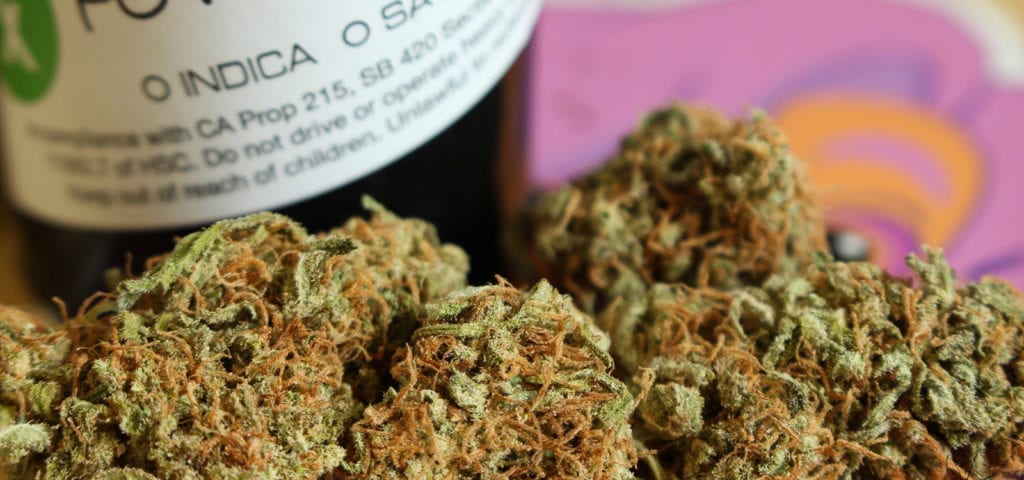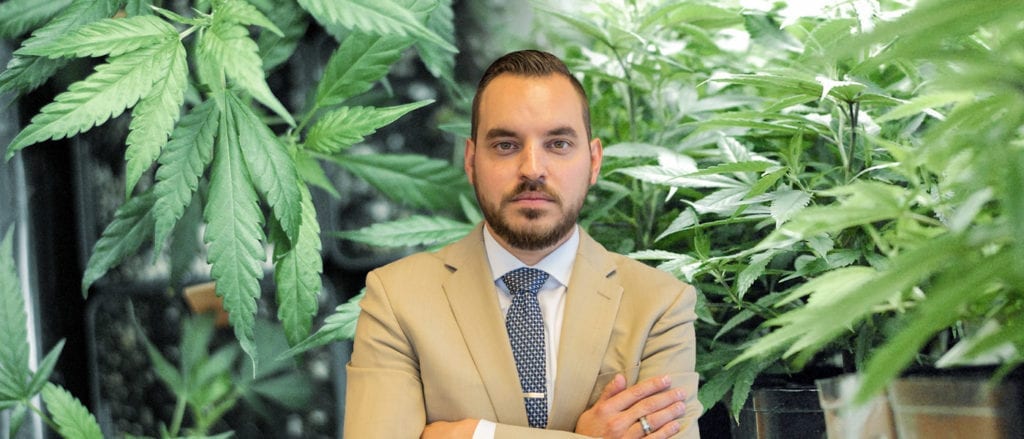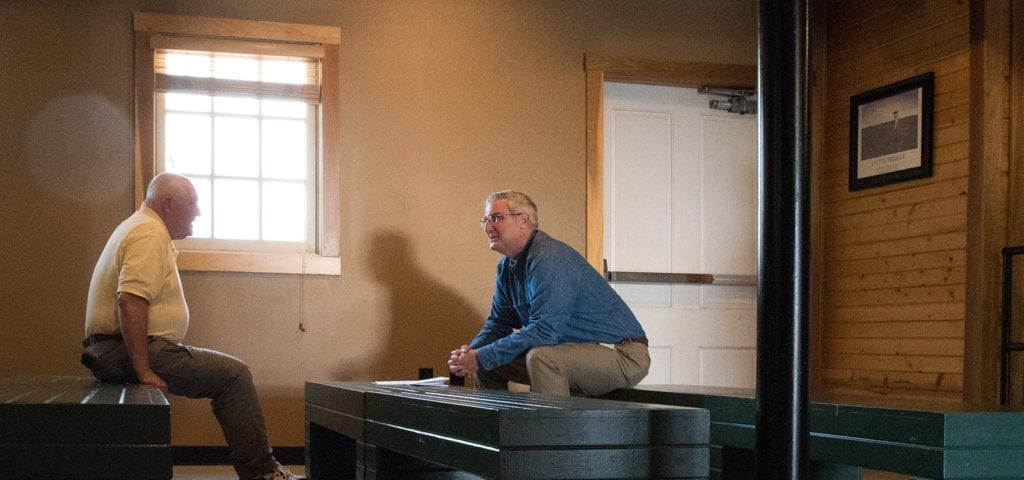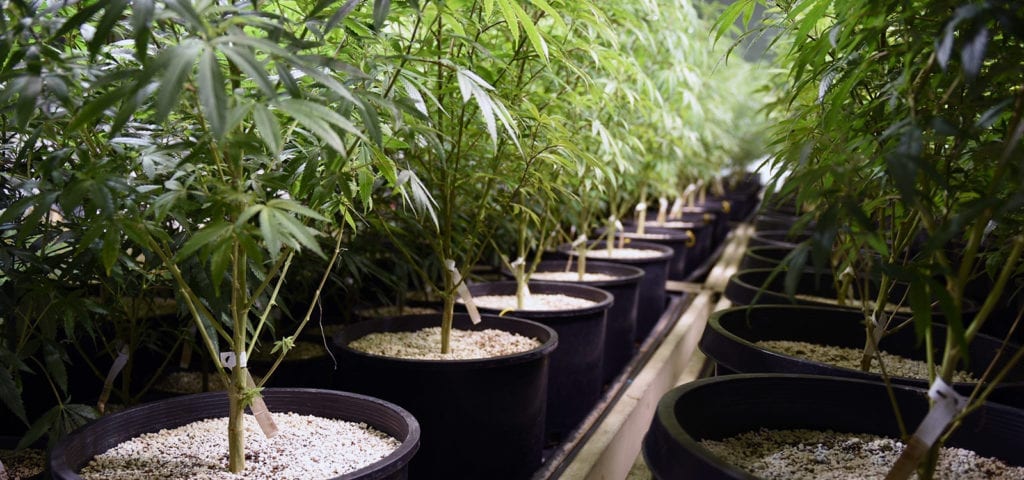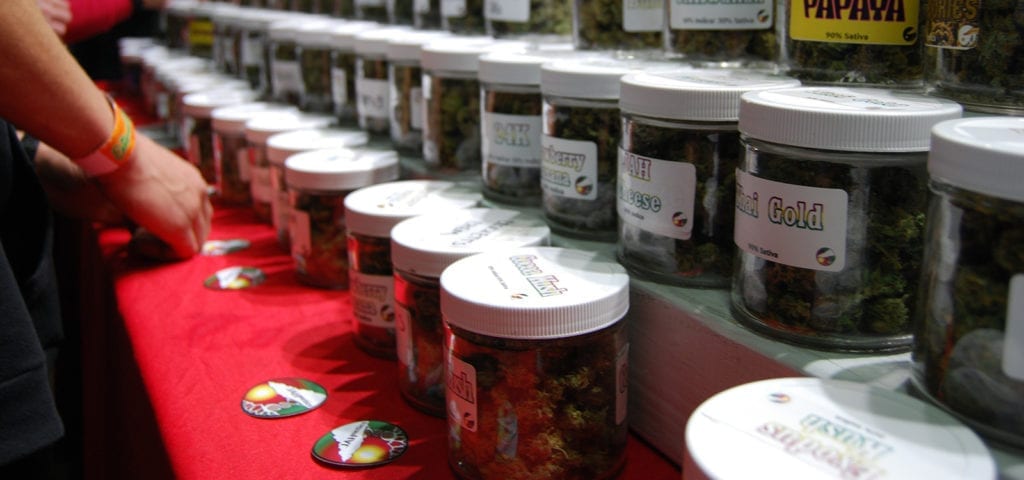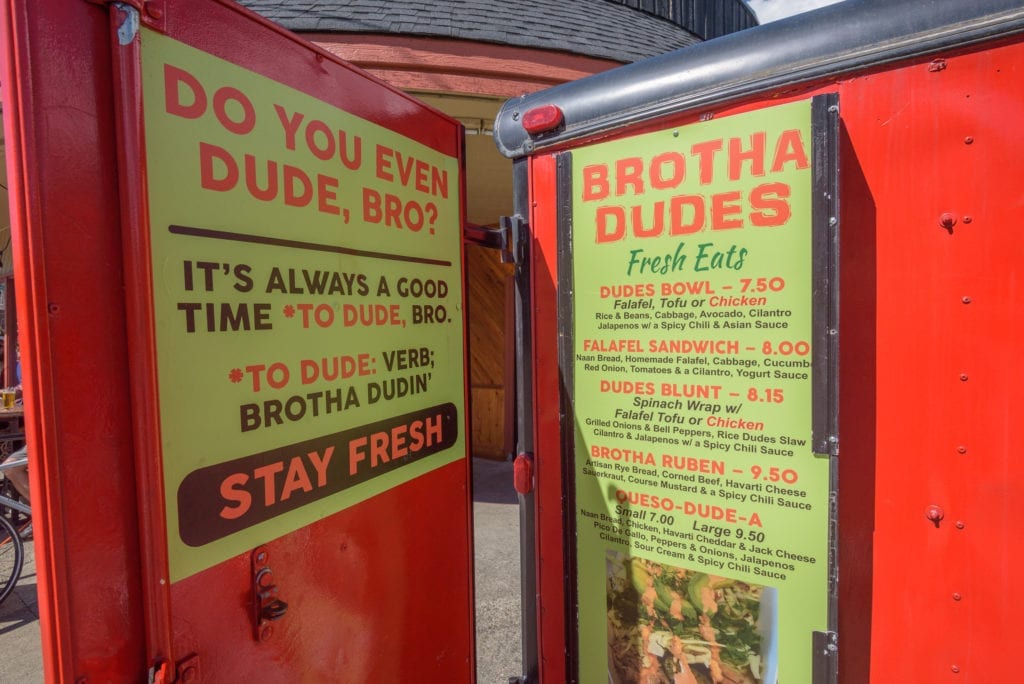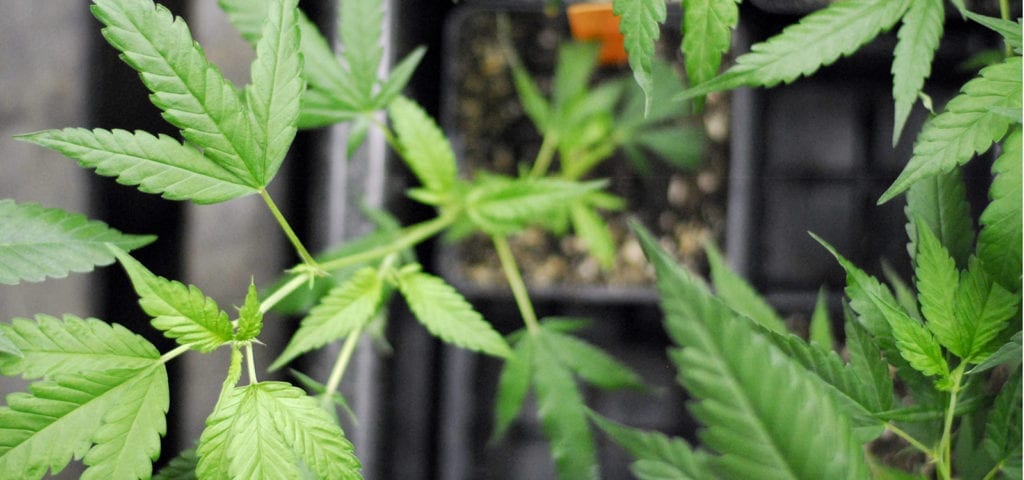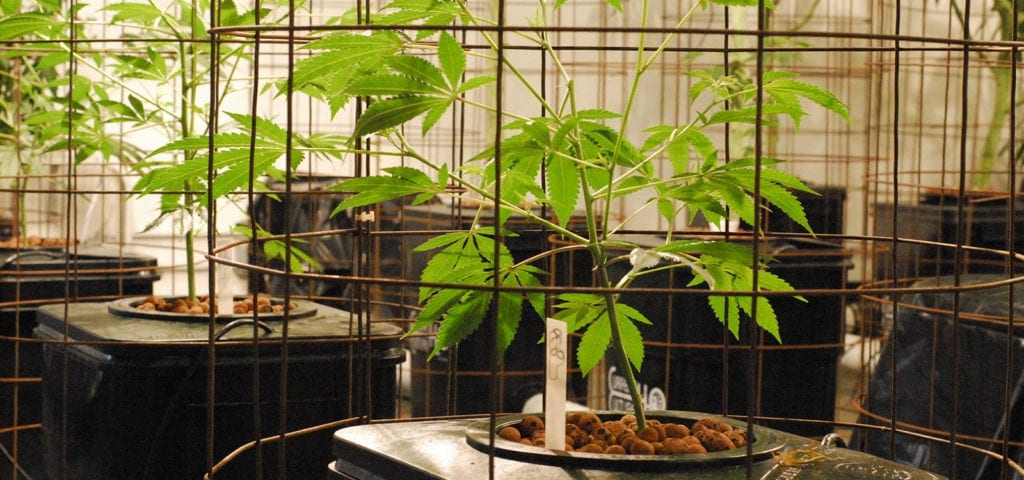Kyle Speidell is the co-CEO of The Green Solution, a popular cannabis retailer chain in Colorado.
In this episode of the Ganjapreneur.com podcast, Kyle joins our host TG Branfalt to discuss Colorado’s retail cannabis market and share what it’s been like as one of the state’s earliest and most successful dispensary enterprises. This interview covers what changes Kyle would like to see to Colorado’s strict cannabis regulatory regime, the early migration from a medical to an adult-use market, and more.
Listen to the podcast via the media player below, or scroll down to read a full transcript of this week’s Ganjapreneur.com podcast episode!
Listen to the podcast:
Read the transcript:
TG Branfalt: Hey, there. I’m your host, TG Branfalt, and you are listening to the Ganjapreneur.com podcast, where we try to bring you actionable information and normalize cannabis through the stories of ganjapreneurs, activists, and industry stakeholders. Today I’m joined by Kyle Speidell. He is the co-CEO of The Green Solution out in Colorado. How you doing today, Kyle?
Kyle Speidell: Very good. Thanks for asking.
TG Branfalt: Before we get into what it is you guys do over there, tell me about yourself, man. How’d you get started in this cannabis space?
Kyle Speidell: Yeah, so we’ve been lucky enough to start in this space since really its infancy. Our opportunity has been really a productive start for us that really no others have really had that opportunity in. I guess it’s a curse and a blessing. The reason I say that is because it was more of the Wild West when we got into it, which was 2010. We started hearing the changes occurring in 2009. That’s when Obama kind of made that, put the first memo out that changed the focus of cannabis, and so we got extremely interested in the opportunity, but for us, up until that time, we were developers, real estate developers. Eric, my co-CEO, was in the Marine Corps, and I was doing real estate acquisitions, and flipping houses, and running a construction company.
Honestly, what occurred was, in 2008-9, we were part of the real estate bubble, and it was literally harder to sell houses than it was to be in the cannabis industry, and so we kind of took our knowledge and real business acumen around planning, development, and stoning and decided, “Well, cannabis, it just applies to that in its own ways.” We got our first store, and it kind of took off from there. We transitioned thinking we’d just get as far as we could in the cannabis industry, depending on how it went, and then as real estate picked back up, we could maybe get back into it. We ended up being really good at it, and here we are today.
TG Branfalt: I did some reading, did some research on you guys. You’re sort of a pioneer of firsts over there. You launched an online cannabis store in 2013, and you conducted the state’s first legal retail sale on January 1st, 2014. You opened the first cannabis outlet store in July. Can you tell me how you identified the need for each one of these projects?
Kyle Speidell: Yeah, absolutely. For us, going back to my first point, which was how long we’ve been in the industry, we’ve certainly been through a lot of tribulations around the growth of the industry and really the voids that kind of came to fruition. Some of those were in software. Some of them were just the legalization and the gap of changing it from medical to rec, things like the outlet store, like you said, and the eCommerce site. These things, some of them came to be just based on changes in regulatory environments, and the others just were gaps that needed to be filled. From our company’s perspective and our vision, we have so many opportunities daily, but from a workload perspective, we’ve been blessed to have a lot of resources along the way that have been able to tackle a lot of different facets of the industry.
We’ve been really analyzing and trying to understand the best way to progress the company in avenues that we knew would not only change our company in a way that would, it’d be more effective, efficient, and more streamlined for our productivity, but also to fill that void where the industry was lacking. We’ve really prided ourself on doing everything as best as possible in the moment that we have, things like going recreational on January 1st. The reason the rest of the state wasn’t able to do that is because when they attempted to transition the laws, there was a lot of red tape, and if you weren’t up to compliance and at the forefront of that, you essentially didn’t get to transition. We were two out of, I believe, the nine stores that went recreational on January 1st, and that only occurred because we were compliant up until that point. Our philosophy around compliancy, and structure, and organization, coupled with our ability to see or have foresight in the market gaps provided that opportunity to really capitalize on these opportunities that existed.
Being a pioneer, I think, is a little easier when you’re in it from the beginning, but I also think that it takes all these other ingredients to really bring that opportunity to fruition, and we certainly have been able to provide that experience and capitalize on it as best as we can.
TG Branfalt: Can you tell me about some of the issues that you faced while launching the online sales and the outlet store, and how did you overcome those issues?
Kyle Speidell: The biggest opportunity for us is to understand it, and so as a CEO, and as my executive team, and their vice presidents and so on and so forth in our company, the one thing that we are very good at and understand is how to be involved when we need to be so that we understand it well. When we’re launching new things and trying to really develop them, we take strong leadership and ownership of those opportunities to make sure that we plug them in in the right places. For example, as we have the opportunity to be vertically integrated, which we are, we are a controller of our agricultural side or cultivation, our manufacturing, our extraction and infused products, and our retail environments, and with that, whatever changes we make, or whatever we do, we have that finger on the pulse in the sense that we know exactly what’s happening in all of the stages and how they affect each other.
Because of that, it allows us to overcome that adversity and the difficulty a lot easier, and that’s why my team has been so operationally intertwined with our conglomerate, because we just ensure that we make the best decisions we possibly can, and as we’ve grown, the company, which now we are just under 700 employees in Colorado, our job is to ensure that the integrity of our detail and understanding of this business is cascaded to the tiers and levels that are under us, so that that information makes it easier for them to overcome the challenges. Honestly, it is really just sheer hard work and determination, and our company and the people that are in it work 80 hours a week and have been doing it for eight, nine years now. It’s the American dream when you think about just applying yourself to something, and it becoming what it is and coming to fruition, so …
TG Branfalt: It’s obvious that you’ve always sort of thought outside of the box. You guys recently partnered with radio personalities, Blazin’ Hit Radio. Can you tell me and the listeners about that project and why you decided it was something that you wanted to proceed with?
Kyle Speidell: Yeah. First, that is an amazing opportunity that we’ve had, and embarking on that journey has been really exciting, but I have one word, and it’s culture. Over the years, the last eight, nine years that we’ve been in this, we certainly have felt that there’s been other driving forces on the culture of cannabis. With an industry that has been suppressed for so long, decades, it needed, it has to have a voice, and there’s advocates. There is owners. There’s patients and customers, and everybody singularly have a voice, but what we don’t have is somebody speaking from the mountaintop all the time trying to convey a message of change, and so there was people like High Times that came into the industry early on that have since disappeared, actually, from the industry. Early on, we really relied on them to create that culture. We looked forward to Colorado, and we saw a great influence, and we started seeing other events popping up here and there.
The one thing we found, though, that they were becoming inconsistent, even with the downtown Civic Center last year. It is now attacked by the mayor, because the people putting it on don’t want to work with the city in creating a positive environment for everybody. What the Blazin’ Hit Radio was meant to do is to provide a new voice to the cannabis culture, and doing it in a way that is fun and entertaining, because trying to attract new people to cannabis is imperative for the strength of the industry. The more that we capture the audience, and the more that we convince people that this is better than opioids, this is better than alcohol, this is better than all these other things that are destroying other cultures or our social well-being, and so our objective is to intertwine the consumer focus of cannabis, which is the day-to-day use, with the lifestyle of cannabis and how that can be a social change in the state.
Colorado’s been given, are blessed to be so far ahead of all these other states that we still have that opportunity to shape the nation, but if we don’t continue pushing our agenda in a way that promotes our opportunity that we have, it’s going to die, and we’re being fought every day by all these other negative people that are trying to take it down in a way, or suppress it in a way that is going to be detrimental. Blazin’ Hit Radio does a lot of things. It is a morning show for you to wake up every day. We do wake and bakes with our talent, which is Larry Ulibarry and Kathie J. They, in their past, have been strong radio hosts in a very predominant hip-hop station here in Colorado, and so we partnered with them to start this revolution, because they love the idea of starting something new that actually has a basis for it, that has a reason and a culture that they can get behind.
Kathie J is not even an avid smoker. She is a everyday housewife, a mom, a entrepreneur herself, but just believes in the fact of, “Let’s stop this,” and so they’ve created all kinds of skits throughout the day. It’s a full-blown radio station that has music all day long, and it’s certainly an opportunity for everybody to really engage, but blazinhitradio.com is where you can go to listen to it, or you can download the app in Google Play or Apple Store, so certainly I encourage anybody to do it, because it’s an awesome time. I mean, you can wake up to us every day.
TG Branfalt: That’s a super interesting project. Super unique, too. I mean, there’s a lot of people trying to roll out cannabis-centric television stations or shows on Roku and stuff, but to … I don’t know, I guess there’s something sort of romantic about taking the airwaves back.
Kyle Speidell: Yeah, and what’s funny about that is, the reason they actually, I guess 50% of the reason they wanted to come over to do this is because they wanted to get out of traditional radio in the sense that they feel like it’s dying, just because everybody has Bluetooth now, and they can connect their phone to their car or to their home in any way, and stop listening to the radio. What they saw is the digital revolution and saying, “Let’s get on digital and let’s support cannabis, and do them together,” and that’s how it came to fruition.
TG Branfalt: Well, I want to talk a bit more about Colorado’s market as a whole. Before we do that, we got to take a break. This is the Ganjapreneur.com podcast. I’m TG Branfalt.
If you are looking for a job in the rapidly growing and highly competitive cannabis industry, Ganjapreneur.com is the place to look. Visit the Ganjapreneur Job Board today to browse current openings with cannabis companies throughout the United States, from entry-level budtender positions to executive-level career opportunities. You can also create a profile and upload your résumé to be discovered by cannabis recruiters. Visit our job board at jobs.ganjapreneur.com to create your profile today. If you are a business owner, you can post your job openings for as little as $25 on our job board to reach the largest and most engaged audience of cannabis professionals on the web. Companies who are listed in the Ganjapreneur Business Directory are eligible for free job listings. If you are already signed up, contact us today via the website, or send us an email at grow@ganjapreneur.com to activate your unique coupon.
TG Branfalt: Hey. Welcome back to the Ganjapreneur.com podcast. I’m your host, TG Branfalt, here with Kyle Speidell, co-CEO of The Green Solution. You have been in Colorado’s market, I mean, from the beginning. Can you sort of describe your experience in the migration from medical to retail?
Kyle Speidell: Yeah. That’s been quite a roller coaster ride, and honestly, you have to think about it as before even regulation was there, and so we’ve been, House Bill 1284 came out in July of, I believe, ’11, and so we operated for about nine months without even regulation, and it was self-governance. It was important to us to really try to rise above and try to become as legitimate as possible in a time in which it was very difficult to even understand where the industry was headed. We actually promoted the fact that we were getting regulation under the medical marijuana laws so that we could then embrace them, because the one thing we wanted was to have a backing from the state against the federal government as this evolved. That was step one.
Step two was learning who we were between the time that we were medical to the time we became recreational, and trying to understand the needs of the patients and how we built a brand and products around the consumer needs, and that was its own challenges in trying to scale the business to a point where we were opening cultivation sites and complementing them with manufacturing to create this. It was certainly a roller coaster ride, and then legalization came to be, and like we discussed prior that we were the first two to actually go recreational, and one thing that we wanted to do was just understand it as fast as possible, understand what the consumer market of recreational would be, and how it would complement medical. The common differences here are very small, and the thing that I think people don’t understand is that we grow cannabis that’s medical within one foot of cannabis that we grow recreationally. There is really no difference in the product itself. Actually, recreational product is significantly more regulated and tested than medical. It’s a common misconception in the industry, actually.
When we embraced recreational, we actually, we’ve been testing all of our products since mid-2014, and medical just started, and they are not even a half of the testing we’ve been doing now for almost two and a half years. What’s interesting about that is, we believed so much more in the recreational way of regulation, which is significantly more testing and regulation around it, because it, again, was a catalyst to making us a better company that we’ve embraced it more than ever. One big change that we’ve made was, all of our stores are recreational at this point, and people call our call centers, we actually have almost a 24 hour a day call center that we allow people to make reservations. We have an eCommerce site that is like Amazon that people use to put reservations in and do call center, or make call-aheads, which is really cool.
TG Branfalt: I mean, you had said that you started even before there was regulation, medical regulation. How have the fluctuating prices in the state affected you, and how have you sort of managed to maintain your business model through that, those constant changes?
Kyle Speidell: Yeah, so part of that comes from just the transition between medical and recreational. It’s certainly been a roller coaster ride, as medical transitioned into recreational, and the recreational cannabis skyrocketed in price, and then the medical almost plummeted. It was almost the exact opposite, and now it’s really transitioned, and a lot of that came from the transition of influx as every new company came online for recreational. What’s important is that we as a company want to somewhat be everything to everyone as much as we possibly can. We want to have products for connoisseur. We want to have a value product for people who are more price-conscious, but it’s a very distinct and difficult thing to do, because of different cannabis growers and how much we have to hold that together on a day-to-day basis and just make, really, almost on-the-spot decisions constantly. Should we fill this shelf with lower … Not lower-quality, but lower-price product, even if it is a better quality, or do we keep it at a high price, and where’s the fluctuation of people?
That comes from us providing just as much consistency as we can around the product, and trying to create a real strong brand around the consistency. With that, we believe that it allows, or keeps customers with us, regardless of kind of the constant fight to the bottom, which is somewhat happening on a day-to-day basis, but we certainly are at a point where we feel like we’re in a great place of the industry is trying to bring the best value to the consumers, and we’re just a catalyst for that. We monitor it day to day and just make determinations as we need to.
TG Branfalt: Then, so just recently, there were some changes in the edible rules. Now, state-wide, you guys can no longer have edibles, gummies shaped like fruit. You can’t actually put the word “candy” or “candies.” It’s fruits, animals, people, balloons, and you can’t put “candy” or “candies” on the packaging. Was this something that you guys were prepared for, and how, if at all, will these new rules affect the industry in Colorado?
Kyle Speidell: Yeah. One thing that we’re consistently dealing with is just the consistent desire from the opposition and the regulators to continuously change the rules. It’s a very difficult thing to overcome. When we have to buy every one of our products or packaging in very small batches to account for the concerns of change, then it really drives the price up. It’s something we’re trying to tackle as much as possible, but to answer the question about the specific changes of the shapes and candies, we’ve been trying to pioneer that for quite some time the actual … Not the change, but trying to get in front of it as we worked through the products. We’ve been complying with that for some time now, but I echo what a lot of legislators have concerns about, which is, where does that end? When does consumer safety and responsibility, when is that ownership on the consumer? We think about that the same way as alcohol, that it doesn’t matter what you do. If somebody wants to get in the package, they will. If they’re old enough to get through the child-resistant packaging, they will.
It’s about a consumer then acting in good faith for their family and what they believe is right, and putting them in safes, and putting them in high places. We have to be as much of an advocate for responsibility as anybody does, and we are, but we also have to draw the line where, where the regulation is. There is a difference between medical and recreational, because the medical has much higher potency than recreational, but in reality, the packaging is not going to stop somebody if they ingest it accidentally from getting high, because five milligrams is going to change your mind state or mindset. It doesn’t matter, and they try to do that distinguish difference, but in my opinion, they should align those significantly more closely.
Most importantly, we should find a happy median for consumers and the commercial producers, because if we continue to have the change occur that regulators are in charge, and advocates and opposition have a bigger voice than consumers or the owners of the businesses, then we’re going to be in a bad place in two or three years where you’re going to have to have 10 times the packaging, and it’s just going to continue driving costs up for the consumer, which I think is a very bad way to operate the industry.
TG Branfalt: You had mentioned these changes that you want to see, that you’d like to see in the state. Before we get into that, I’ve got to take a break. This is Ganjapreneur.com podcast and TG Branfalt.
At Ganjapreneur, we have heard from dozens of cannabis business owners who have encountered the issue of cannabias, which is when a mainstream business, whether a landlord, bank, or some other provider of vital business services, refuses to do business with them simply because of their association with cannabis. We have even heard stories of businesses being unable to provide health and life insurance for their employees because the insurance providers were too afraid to work with them. We believe that this fear is totally unreasonable and that cannabis business owners deserve access to the same services and resources that other businesses are afforded, that they should be able to hire consultation to help them follow the letter of the law in their business endeavors, and that they should be able to provide employee benefits without needing to compromise on the quality of coverage they can offer.
This is why we created the Ganjapreneur.com Business Service Directory, a resource for cannabis professionals to find and connect with service providers who are cannabis-friendly and who are actively seeking cannabis industry clients. If you are considering hiring a business consultant, lawyer, accountant, web designer, or any other ancillary service for your business, go to ganjapreneur.com/businesses to browse hundreds of agencies, firms, and organizations who support cannabis legalization and who want to help you grow your business. With so many options to choose from in each service category, you will be able to browse company profiles and do research on multiple companies in advance so you can find the provider who is the best fit for your particular need. Our Business Service Directory is intended to be a useful and well-maintained resource, which is why we individually vet each listing that is submitted.
If you are a business service provider who wants to work with cannabis clients, you may be a good fit for our service directory. Go to ganjapreneur.com/businesses to create your profile and start connecting with cannabis entrepreneurs today.
TG Branfalt: Hey, there. Welcome back. I’m your host, TG Branfalt, and you are listening to the Ganjapreneur.com podcast. I’m here with Kyle Speidell, co-CEO of The Green Solution. You had mentioned before the break, we were talking about edibles, some of the changes that you’d like to see enacted in the state. Are there any other issues or regulations that you’d like to see either added to the state’s regime or removed from the regulations?
Kyle Speidell: Yeah. I think that the first thing is somewhat of what I mentioned earlier, which is the constant change of the industry. We want to pull that back. Everybody has an opinion, which is fine. We don’t want to suppress people’s voice, but we certainly want to focus that into a strategic analysis over time. We don’t want to constantly change things, because every year we’re changing things we just implemented, and there’s nobody saying or really providing data that allows us to know if it works or not. The industry is in its infancy still, in reality, and when you think of eight years, we’ve had seven or eight different rule changes along the way that have completely changed everything, and so how does anybody know how well it works without just letting it work for a time? That’s number one.
From there, we certainly want to align the medical and recreational side more, because we feel that there are a lot of great things that are occurring in recreational that aren’t occurring in medical, and vice versa. The more that we can bring those two together, one thing that we do as a company is, we provide reciprocity in our stores. We’re one of the only companies in the state that do that. What that does is, it allows other medical companies or medical states to have that same card and use it in our stores, and we do that, actually, because we do it under the recreational model. What we don’t … We don’t believe the differentiation between medical and rec in a way that the products are worse, because in reality, we, again, have more regulation around cannabis in the retail market than we do in the medical, so we call our store an adult-use store. We provide a 15% discount to any medical patients in the state and provide reciprocity.
When you come into our stores, there’s no difference between medical and rec, and we want to see that from a legislative perspective, because it is impossible to have … Think about it this way. If we have 12 stores, and every one of them are medical and rec, we’re really operating 24, because they have to have distinctly different inventory, different people working them, and segregation in the building in all ways, virtually and physically. That is such an onerous way to operate a business. One, it drives up consumer costs, which doesn’t make any sense, and two, it provides an ambiguous way to operate from a regulatory … They don’t even know the rules when you ask them as much as they should, and so the more that we can align the good things of retail with the good things of medical, and try to provide an adult-use market, and whether that continues having medical cards, I think it’s an amazing thing to help cancer patients and specific people in need, and let’s provide an outlet for that.
I can increase the limit so they don’t have to come to the stores as often, but let’s keep the regulation and the environment consistent, because we, as the industry, would flourish if this difference wasn’t in place. Really excited to kind of progress that agenda, and certainly something we’re advocating for.
TG Branfalt: Then, so in Denver there’s a lot of chatter right now about the social use initiative. A lot of people are saying that the program is too limited and that few will actually get these licenses. What’s your sort of take on that program?
Kyle Speidell: I echo the fact that it’s too restrictive. I know it is a double-edged sword. The reasoning I’ve heard behind it is just that they don’t want to progress the cannabis agenda in a time when we have a president and an attorney general that are not in favor of this industry in a way that they should be, and because of that, I think they’re tiptoeing around the idea. Now, they do that, though, because they’re trying to put in place a strong regulatory body, but what I think they’re failing to understand is that when people come to Colorado, they have no place to use cannabis, and having or missing that key component pushes it into the streets, pushes it into places that it shouldn’t be, which is, God forbid, someone’s car, or the alley around their hotel, or the public places, like a park. Those are places that, if people could enjoy it under a closed roof, what are they hurting?
It happens every day in every single other person’s household, so not providing that outlet is actually more detrimental, in my opinion, to the federal guidelines that they’re trying to follow, which is tighter regulation, than it is if they were to allow it. To me, I feel that they should embrace it. It’s certainly a huge gap that we are working with our government relations side on to promote, because I believe it would change the culture, again, of Colorado significantly, where people stop ingesting alcohol all night long and mellow out, and they stop smoking it on 16th Street Mall when they’re forced to. They shouldn’t be doing that if we don’t have to, and I think it’s a huge gap that we need to fill.
TG Branfalt: I think that’s a really, really interesting take. I don’t live in Colorado, and the idea, and I’ve always read the excuse, “Oh, well, we’re trying to prevent federal crackdown,” and I’m like, “Well, why don’t you just put people inside?” Right? That way, it’s not in everyone’s face. What’s next for you guys, man? What’s next for The Green Solution? The market’s maturing. You guys are maturing right along with it. Radio stations and outlet stores. What’s next?
Kyle Speidell: Yeah. For us, it’s really never going to end. We’re going to continue pushing the envelope as much as we can. We love to be cutting-edge. Certain things, we develop all of our own software, so we’re working on a strategy for our retail environment, for customers to be in the stores autonomously so that they can kind of get in and out as they need. We’re opening more locations. We’re expanding the consumer experience digitally and in the retail environment. We’re focusing on new products coming out which are tons, a lot of new lines, some revolutionary that you’ve never seen. New types of pre-rolls, new types of edibles and concentrates that are not only new to the market, but new products inside categories that are already existing. We’re just excited to be at the forefront of this, but we see it as an expectation for us to push this as hard as we can, because we don’t ever want it to return to the underground nature that it was for five decades.
For us, it’s about trying to fit in as a normal business in every way, whether that is our offices being downtown so that we’re on the heart of Wall Street, because cannabis belongs there, to us being some of the best online stores and websites out there. We just want to continue making waves and providing as much opportunity for access around the globe as possible. We have a franchise model that allows us to expand rapidly nationally, so we’re in Florida, Illinois, Oregon, and Nevada currently, with a few other states that we’re bringing on as well. Our goal is to not let those states start where we started eight years ago. We want them to start where we are today in Colorado and continue pushing that movement so that we push our agenda from a legalization standpoint as fast as possible so that it can’t be suppressed. That’s what’s going on over here at The Green Solution. I mean, we’re just never going to stop, and we’re excited to just have the opportunity to tell our story on Ganjapreneur and anywhere else that’s willing to listen.
TG Branfalt: Finally, what advice would you have for other entrepreneurs?
Kyle Speidell: I’ve been an entrepreneur my entire life. The thing that really drives me and what I’ve learned over time is, define and believe in a strategy and just build from it, and don’t pivot. Don’t pivot that strategy until you absolutely know there is a reason. A lot of young entrepreneurs pick a strategy, and then they prematurely move to another strategy without getting the data, without understanding what the real facts of it are, and the thing that has drove us over time is listening to our consumers, listening all the time. We never pivoted from what our core ideas and strategies were, because we wanted to continue understanding who and what we’re doing in this industry and any other business I’ve been in, and just listening and staying true to your course is the best advice I can give you.
TG Branfalt: Finally, where can people find out more about you, more about what you guys do, more about The Green Solution?
Kyle Speidell: Yeah, so our eCommerce website, you can find us online at mygreensolution.com. We have 13 current locations in Colorado, and around the nation we have another five as we speak. You can call, also, our phone lines at 303-990-9723. That gets you directly to our call center, which, at that point, will give you any information about our products, the people behind the scenes, the culture of The Green Solution, or any other facts or questions you have. We love to listen to anybody, and all of those questions and concerns make it to us. We are listening all the time, and would love your feedback on us about the, or the industry or anything else that you’d like to talk about. Really appreciate the opportunity.
TG Branfalt: Look, you’re an OG man. You’ve been in this industry a long, long time, so I think it’s really great that you have the opportunity to get your sort of philosophy out there and your products, your story out there. I really appreciate you taking the time.
Kyle Speidell: Absolutely. I appreciate it as well.
TG Branfalt: You can find more episodes of the Ganjapreneur.com podcast in the podcast section at Ganjapreneur.com and in the Apple iTunes Store. On the Ganjapreneur.com website, you will find the latest cannabis news and cannabis jobs updated daily, along with transcripts of this podcast. You can also download the Ganjapreneur.com app in iTunes and Google Play. I’ve been your host, TG Branfalt. I just blew my own name.



